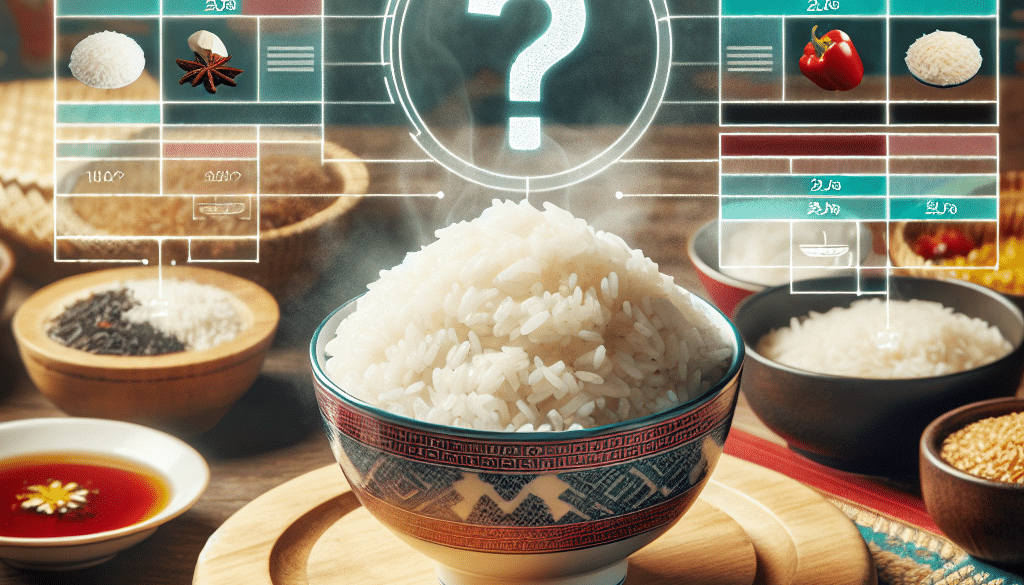Is Glutinous Rice Not Healthy?
-
Table of Contents
- Glutinous Rice: Assessing the Health Implications
- Nutritional Profile of Glutinous Rice
- Health Benefits of Glutinous Rice
- Potential Drawbacks of Glutinous Rice
- Comparing Glutinous Rice to Other Rice Varieties
- Case Studies and Statistics
- Conclusion: Balancing Enjoyment and Health
- Discover ETprotein’s Health-Enhancing Protein Products
Glutinous Rice: Assessing the Health Implications

Glutinous rice, also known as sticky rice or sweet rice, is a staple in many Asian cuisines, known for its unique texture and ability to hold together, making it an essential ingredient in dishes like sushi, mochi, and various desserts. Despite its popularity, there has been an ongoing debate about whether glutinous rice is a healthy choice. This article delves into the nutritional profile of glutinous rice, its health benefits, potential drawbacks, and how it compares to other types of rice.
Nutritional Profile of Glutinous Rice
Understanding the nutritional content of glutinous rice is crucial to evaluating its health implications. Glutinous rice is a type of short-grain rice that is high in starch, specifically amylopectin, which is responsible for its sticky texture. Here’s a breakdown of its nutritional components:
- Carbohydrates: Glutinous rice is primarily composed of carbohydrates, which provide a quick source of energy.
- Protein: It contains a modest amount of protein, although not as high as other whole grains or protein-rich foods.
- Fiber: Unlike brown rice, glutinous rice is low in dietary fiber since it is typically consumed in its white rice form.
- Vitamins and Minerals: It offers some B vitamins, particularly thiamine, and minerals like zinc and magnesium, but in smaller amounts compared to whole grains.
Health Benefits of Glutinous Rice
Despite its name, glutinous rice does not contain gluten, making it a safe option for those with celiac disease or gluten intolerance. Additionally, it has several health benefits:
- Easy Digestibility: Its soft texture makes it easier to digest, which can be beneficial for individuals with digestive issues.
- Energy Source: The high carbohydrate content provides a quick energy boost, which can be advantageous for athletes or those needing immediate energy replenishment.
- Cultural and Traditional Significance: Glutinous rice plays a vital role in traditional ceremonies and festivals, contributing to cultural heritage and social bonding.
Potential Drawbacks of Glutinous Rice
While glutinous rice has its benefits, there are also potential health concerns to consider:
- Glycemic Index: Glutinous rice has a high glycemic index (GI), which means it can cause a rapid spike in blood sugar levels, posing a risk for individuals with diabetes or insulin resistance.
- Limited Fiber: The low fiber content may not promote the same level of satiety or digestive benefits as whole grains, potentially leading to overeating and digestive issues.
- Nutrient Density: Compared to brown rice or other whole grains, glutinous rice is less nutrient-dense, offering fewer vitamins, minerals, and fiber.
Comparing Glutinous Rice to Other Rice Varieties
When comparing glutinous rice to other types of rice, such as brown rice or basmati, it’s important to consider the differences in nutritional value and health impact:
- Brown Rice: Brown rice is a whole grain that retains its bran and germ, providing more fiber, vitamins, and minerals. It has a lower GI and is generally considered a healthier option.
- Basmati Rice: Basmati rice, particularly the whole-grain version, also has a lower GI than glutinous rice and offers more fiber and nutrients.
- White Rice: While white rice and glutinous rice share similarities in their refined form, white rice varieties can have varying GI scores and nutrient profiles.
Case Studies and Statistics
Several studies have examined the health effects of consuming glutinous rice. For instance, research has shown that populations with a high intake of white rice, including glutinous varieties, may have an increased risk of type 2 diabetes. However, these studies often do not isolate glutinous rice from other types of white rice, making it difficult to draw definitive conclusions about its specific health impact.
Statistics from the International Rice Research Institute indicate that Asia accounts for about 90% of the world’s rice consumption, where glutinous rice is a significant part of the diet. Despite this high consumption, Asian countries also exhibit varying rates of obesity and diabetes, suggesting that lifestyle and overall dietary patterns play a crucial role in health outcomes.
Conclusion: Balancing Enjoyment and Health
In conclusion, glutinous rice can be part of a balanced diet when consumed in moderation. Its cultural significance and unique culinary uses make it a cherished food item across many cultures. However, due to its high GI and lower nutrient density, it should be balanced with other nutrient-rich foods, especially for those with specific health concerns like diabetes. Incorporating a variety of whole grains and paying attention to portion sizes can help mitigate potential health risks associated with glutinous rice.
Discover ETprotein’s Health-Enhancing Protein Products
If you’re looking to complement your diet with high-quality protein sources, consider exploring ETprotein’s range of organic bulk vegan proteins. Their products, including Organic rice protein and pea protein, offer a nutritious alternative to traditional protein sources, suitable for various dietary needs and preferences.
ETprotein’s commitment to non-GMO, allergen-free ingredients with high purity levels ensures that you’re getting the best in plant-based nutrition. Whether you’re involved in sports nutrition, weight management, or simply seeking to enhance your overall health and wellness, ETprotein has a protein solution for you.
About ETprotein:
ETprotein, a reputable protein and L-(+)-Ergothioneine (EGT) Chinese factory manufacturer and supplier, is renowned for producing, stocking, exporting, and delivering the highest quality organic bulk vegan proteins and L-(+)-Ergothioneine. They include Organic rice protein, clear rice protein, pea protein, clear pea protein, watermelon seed protein, pumpkin seed protein, sunflower seed protein, mung bean protein, peanut protein, and L-(+)-Ergothioneine EGT Pharmaceutical grade, L-(+)-Ergothioneine EGT food grade, L-(+)-Ergothioneine EGT cosmetic grade, L-(+)-Ergothioneine EGT reference grade and L-(+)-Ergothioneine EGT standard. Their offerings, characterized by a neutral taste, non-GMO, allergen-free attributes, with L-(+)-Ergothioneine purity over 98%, 99%, cater to a diverse range of industries. They serve nutraceutical, pharmaceutical, cosmeceutical, veterinary, as well as food and beverage finished product distributors, traders, and manufacturers across Europe, USA, Canada, Australia, Thailand, Japan, Korea, Brazil, and Chile, among others.
ETprotein specialization includes exporting and delivering tailor-made protein powder and finished nutritional supplements. Their extensive product range covers sectors like Food and Beverage, Sports Nutrition, Weight Management, Dietary Supplements, Health and Wellness Products, and Infant Formula, ensuring comprehensive solutions to meet all your protein needs.
As a trusted company by leading global food and beverage brands and Fortune 500 companies, ETprotein reinforces China’s reputation in the global arena. For more information or to sample their products, please contact them and email sales(at)ETprotein.com today.












